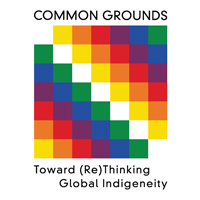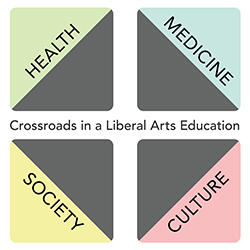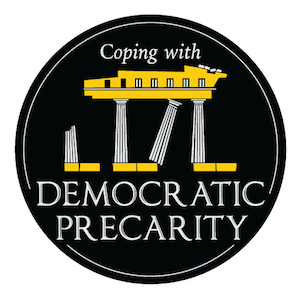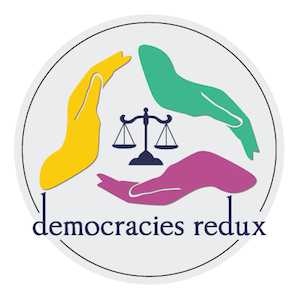Past Long-Term Projects
Since 1998, the Kahn Institute has launched dozens of innovative long- and short-term projects that have brought together a wide range of students and faculty members. If you have questions about past projects, please contact us at kahninstitute@smith.edu.
Common Grounds: Toward (Re)Thinking Global Indigeneity
 LONG-TERM PROJECT, 2022-23
LONG-TERM PROJECT, 2022-23
Around the world indigenous peoples and their histories face questions of marginalization, climate change and global hegemony while maintaining their histories and distinct sovereignties. We are called to consider the forces of colonization, settler colonialism, and racial capitalism across North America, the western hemisphere, and the globe. Common Grounds seeks scholars working on topics that address the indigenous question "within" urgent issues such as: seal-level rise, femicide, agricultural sciences, territorial sovereignties, the digital world, public health, climate justice, border-crossing, the Anthropocene, global trade, and internationalism, among others. 
Health and Medicine, Culture and Society: Crossroads in a Liberal Arts Education
 Semester-long Project, Fall 2022
Semester-long Project, Fall 2022

The COVID-19 pandemic has rendered longstanding footholds of racism, racialization, and xenephobia in public health and medicine hypervisible. Early news articles on cases in the United States disproportionately featured images of Asian and Asian-American people. Poorly planned and communicated travel bans stoked xenophobia. And former President Trump's perpetual framing of the virus as connected to China amplified racism and violence against Asians and Asian-Americans. This semester-long project recognizes our current moment as an opportune one, especially as we navigate new terrain in the college classroom as the pandemic continues to unfold, to examine past and present ways that systems of power manifest in uneven ground upon which people must attend to their health and negotiate medical systems.
Coping with Democratic Precarity and the Prospects for Democratic Renewal

Democracy is faltering. At every level of governance and across multiple domains, democratic institutions, norms and practices are under increasing strain. The questions and problems are vexing, wide-ranging, and cross-cutting, and, thus, offer rich possibilities for interdisciplinary engagement. This Kahn Institute project will bring together scholars from across disciplines to explore the causes and effects of democratic precarity. It will also engage scholars across disciplines who direct their attention to possibilities for pathways toward democratic renewal and the realization of high-quality democracy within communities, countries, and in domains of global governance.
Democracies Redux: Resumptions, Resilience, Reconciliation, and Restoration (2021-22)
 LONG-TERM PROJECT, 2021-22
LONG-TERM PROJECT, 2021-22

Democracies Redux is an invitation to open up what democracies might mean, carry, and create, when reconsidered as ways of knowing and being that upheld inter-relationships, inclusivity, and the work of restitution and renewal. Democracies in this project centers itself in investigative commitments that reimagine democracies’ polyvalent manifestations and vital possibilities in the passageways of life, matter, ideas, and their mutuality. This project is as much about generativity as it is productivity. In this vein, the project is also a physical address from which the work of resumptions and restoration can be carried out.
Year on Democracies (2021-22)
Imagining Climate Change: From Slow Violence to Fast Hope (2020–21)
This yearlong Kahn project will bring together scholars from across the disciplines to ask how climate change forces—and inspires—us to shift our habits of thought, representation, and communication. We believe that recognizing the slow violence of climate change is urgent work. We will probe the magnitude of this slow violence while daring to envision and nurture the hope that turns indifference into action.
Technophilia/Technoskepticism (2020–21)
When this seminar begins in 2020, the Internet of Things (IoT) and 5G promise to shift daily lives—in conjunctions with, and through resistance to—myriad older technologies. When technologies change the world, what happens? Thinking expansively about technology and its work in the world, this yearlong Kahn project invites discussions about creativity and data, machines and knowledge production. From moveable type to drones, prison architecture to bioinformatics, innovation has long tested our ethics, if not also our ways of being human. What are the implications of innovation?
TranslationS (2019–20)
Translation has always been part of what makes us human. This yearlong Kahn project draws attention not only to the traditional practice of translation in the literary field, but also to its role in a wide range of disciplines, as well as to its capacity to animate conversation across disciplines.
Fear (2019–20)
What is fear? Why is fear so widespread? How does it shape personal behavior and public policy? This is a topic that cries out for collaboration: among neuroscientists and biologists, psychologists, political scientists, economists, media studies scholars, historians, anthropologists and sociologists, scientists, philosophers and cultural critics.
Refugees (2018-19)
This project seeks to draw together faculty from a wide range of fields whose work intersects with the subject of forced displacement, to consider this complicated subject not only through the lens of historians and contemporary policy scholars, but also from the perspective of economists, social workers, psychologists, educational theorists, and artists.
Food (2018-19)
Once the discourse only of anthropologists, food has become a growing area of research and discussion in disciplines ranging from sociology to biology, literature to politics. Our goal is to address questions that resonate across many fields with scholars of food from across the liberal arts cirriculum in this collaborative and sometimes hands-on exploration.
Destroy then Restore (2017-18)
This yearlong project explores the dynamic interaction between human societies and natural processes, waters, and landscapes.
War (2017-18)
Despite efforts to outlaw it and undermine its legitimacy, war remains with us; it is a persistent human institution.This yearlong Kahn project will bring together scholars from across the disciplines whose work touches on war in all of its complex facets and dimensions.
Shaping Perception (2016-17)
This yearlong Kahn project will explore the concept of perception as an essential form of human experience, an aspect of ourselves that defines who we are and how we relate to the world.
Play (spring 2016)
This one-semester project aims to approach play from a variety of disciplinary perspectives in order to enrich our understanding, not only of what play is, but also of what we might gain by seeing as play some practices currently defined in other ways.
Modes and Models of Making (2016-17)
In this yearlong Kahn project we are interested in exploring how the idea of "making" infuses our sense of the world. What does it mean to make something? Is making a mode of knowing? Why are some kinds of production driven by desires for innovation, others for commitments to habits and ritual? Why are some forms of making risk-averse and others risk-seeking? How do different disciplines approach answers to these questions?
Memory (2015-16)
This yearlong project aims to consider the great range of mechanisms, uses and representations of memory across disciplinary fields, with a particular focus on how the limitations of memory, and the ways in which memory can be manipulated, impact both the individual and society.
